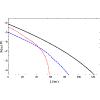当前位置:
X-MOL 学术
›
Phys. Rev. A
›
论文详情
Our official English website, www.x-mol.net, welcomes your
feedback! (Note: you will need to create a separate account there.)
Security of finite-key-length measurement-device-independent quantum key distribution using an arbitrary number of decoys
Physical Review A ( IF 2.6 ) Pub Date : 2020-07-13 , DOI: 10.1103/physreva.102.012611 H. F. Chau
Physical Review A ( IF 2.6 ) Pub Date : 2020-07-13 , DOI: 10.1103/physreva.102.012611 H. F. Chau

|
In quantum key distribution, measurement-device-independent and decoy-state techniques enable the two cooperative agents to establish a shared secret key using imperfect measurement devices and weak Poissonian sources, respectively. Investigations so far are not comprehensive as they restrict to less than or equal to four decoy states. Moreover, many of them involve pure numerical studies. Here I report a general security proof that works for any fixed number of decoy states and any fixed raw key length. There are two key ideas involved here. The first one is the repeated application of the inversion formula for the Vandermonde matrix to obtain various bounds on certain yields and error rates. The second one is the use of a recently proven generalization of the McDiarmid inequality. These techniques raise the best provably secure key rate of the measurement-device-independent version of the Bennett-Brassard 1984 scheme by at least 1.25 times and increase the workable distance between the two cooperative agents from slightly less than 60 km to slightly greater than 130 km in case where there are photon pulse pairs sent without a quantum repeater.
中文翻译:

使用任意数量的诱饵的有限键长独立于测量设备的量子密钥分配的安全性
在量子密钥分配中,独立于测量设备和诱骗状态的技术使两个合作代理分别使用不完善的测量设备和弱泊松源建立共享的秘密密钥。迄今为止的调查尚不全面,因为它们限制为小于或等于四个诱饵状态。此外,其中许多涉及纯数值研究。在这里,我报告了一种通用的安全证明,该证明适用于任何固定数量的诱骗状态和任何固定原始密钥长度。这里涉及两个关键思想。第一个是对Vandermonde矩阵重复应用反演公式,以在一定的收益率和错误率上获得各种界限。第二个是使用最近证明的McDiarmid不等式的推广。 没有量子中继器发送的光子脉冲对。
更新日期:2020-07-13
中文翻译:

使用任意数量的诱饵的有限键长独立于测量设备的量子密钥分配的安全性
在量子密钥分配中,独立于测量设备和诱骗状态的技术使两个合作代理分别使用不完善的测量设备和弱泊松源建立共享的秘密密钥。迄今为止的调查尚不全面,因为它们限制为小于或等于四个诱饵状态。此外,其中许多涉及纯数值研究。在这里,我报告了一种通用的安全证明,该证明适用于任何固定数量的诱骗状态和任何固定原始密钥长度。这里涉及两个关键思想。第一个是对Vandermonde矩阵重复应用反演公式,以在一定的收益率和错误率上获得各种界限。第二个是使用最近证明的McDiarmid不等式的推广。 没有量子中继器发送的光子脉冲对。











































 京公网安备 11010802027423号
京公网安备 11010802027423号